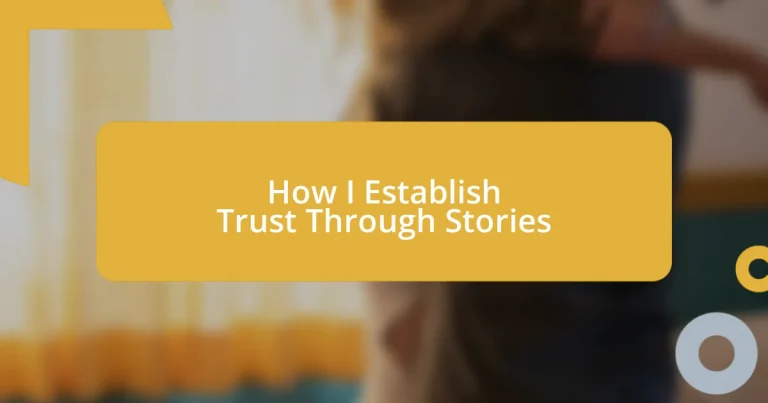Key takeaways:
- Storytelling fosters deep emotional connections by revealing personal experiences and shared struggles, promoting empathy and community.
- Authenticity and vulnerability in narratives encourage others to engage and share their own stories, creating a supportive environment.
- Stories serve as powerful tools for conveying values and inspiring introspection, facilitating meaningful conversations about shared beliefs and experiences.
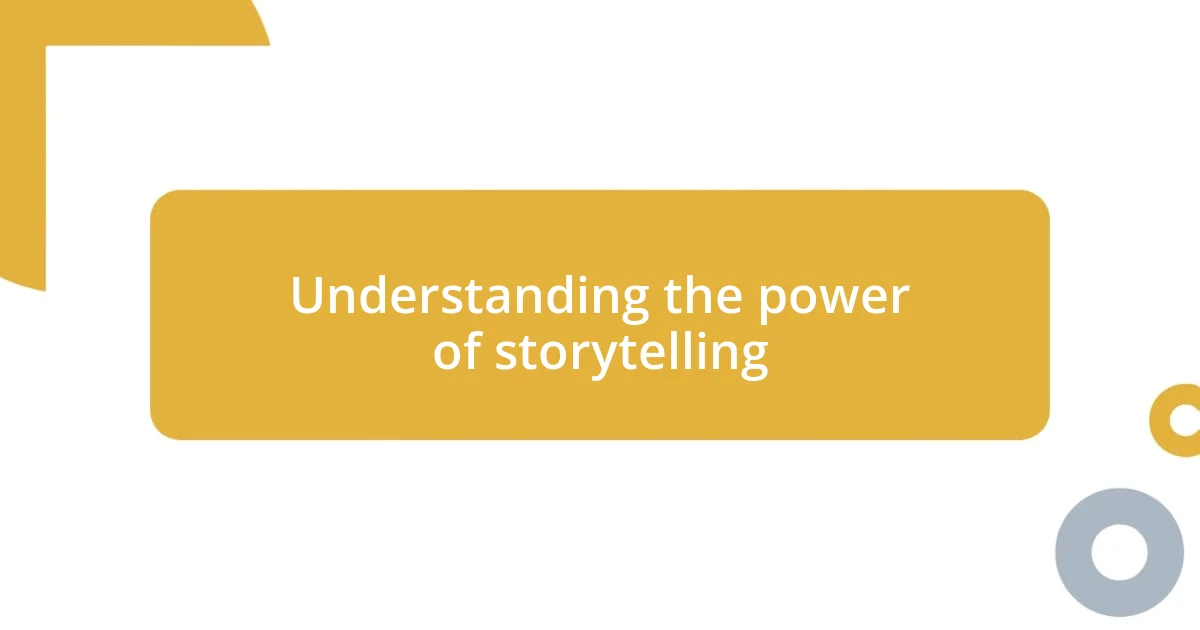
Understanding the power of storytelling
Stories have a unique ability to resonate with us on a personal level. I remember sitting around a campfire during a summer retreat, captivated by a friend’s tale of overcoming adversity. The way he wove his emotions and experiences together not only held our attention but also fostered a deeper connection among us all. Isn’t it fascinating how a well-told story can reveal our shared struggles and triumphs, making us feel less alone?
Storytelling taps into our innate need for connection and understanding. I often think back to my childhood, when the tales my grandmother shared became lasting lessons for me. Each story was woven with wisdom, but it was her voice—filled with emotion—that made me truly appreciate the lessons behind them. Don’t you feel a surge of nostalgia when you recall a story that shaped your understanding of the world?
Furthermore, stories can inspire change and provoke thought. I once listened to a speaker who shared her journey through grief, and it struck a chord within me. As she detailed her experiences, I realized how powerful vulnerability can be. It made me question: how often do we shy away from sharing our own stories, fearing judgment? But perhaps, through our narratives, we can invite empathy and inspire others to break their own silences.
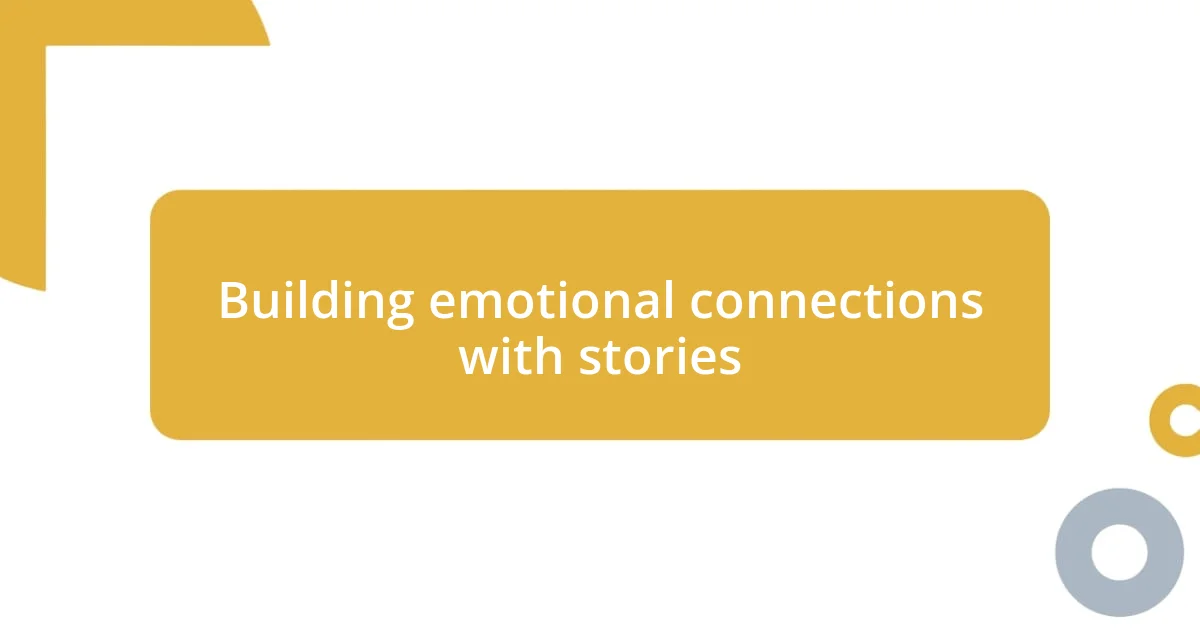
Building emotional connections with stories
Stories create bridges between our emotions and experiences, fostering connections that often transcend our differences. I recall a moment during a volunteer event when a young boy shared his story of losing his home in a fire. His innocent, heartfelt recounting not only drew tears but also inspired all of us to band together and provide support. In that instant, we were reminded of our shared humanity and the power that vulnerability holds in connecting us.
- Storytelling evokes empathy by revealing personal experiences.
- Vulnerable narratives encourage listeners to reflect on their own feelings and experiences.
- Sharing triumphs and struggles fosters a sense of community and belonging.
- Emotional stories invite active engagement, making the audience feel invested in the storyteller’s journey.
- Through these connections, we often discover insights that resonate deeply, creating lasting emotional ties.
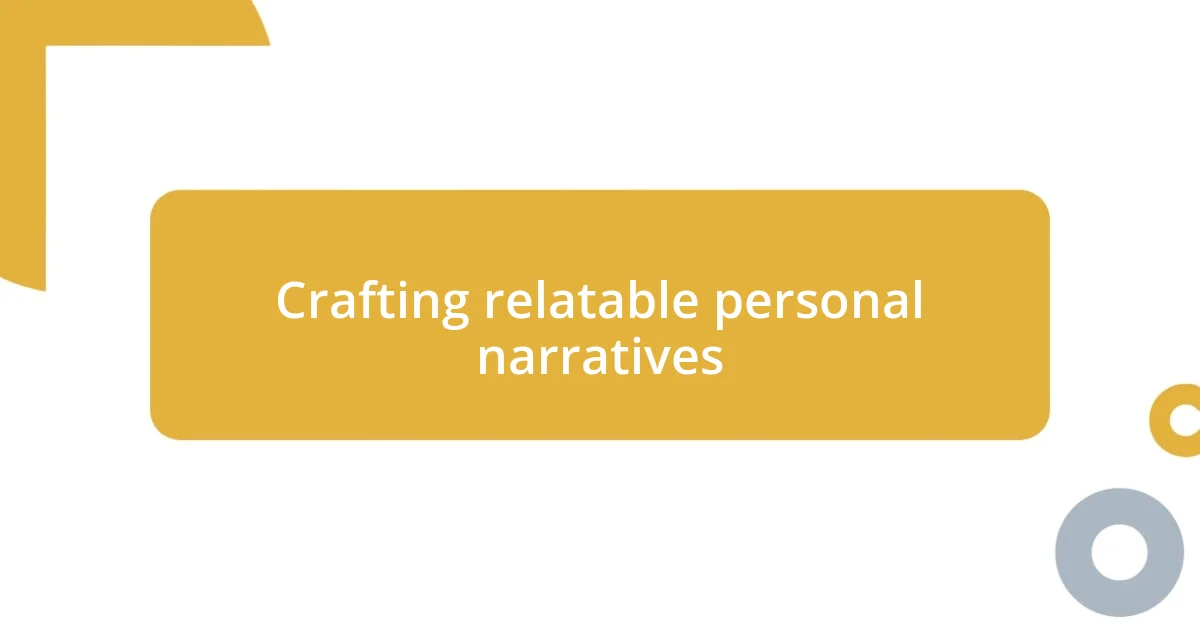
Crafting relatable personal narratives
Crafting relatable personal narratives requires authenticity and vulnerability. I remember writing a piece about my own battle with anxiety. Sharing those feelings publicly was daunting, but to my surprise, many reached out, expressing they felt similar struggles. It was in these shared experiences that I discovered a communal strength, making both my story and theirs resonate more deeply.
When I think about what makes a narrative truly relatable, I’m reminded of a dinner party where I recounted a funny mishap from my travels. As I stumbled through the story, laughter erupted, and I realized that humor brings people together. It’s intriguing how a light-hearted moment can illuminate our differences while highlighting our shared humanity.
In creating relatable narratives, it’s essential to weave in specific emotions and universal themes. During my first public speaking event, my nervousness was palpable. As I shared my story about facing my fears, I noticed heads nodding in understanding. I felt an electric connection in the room, proving that our stories can bridge gaps and unify us, even in moments of vulnerability.
| Characteristics | Example |
|---|---|
| Authenticity | Sharing my battle with anxiety |
| Humor | Funny mishap during travels |
| Universal themes | Nervousness during a public speaking event |
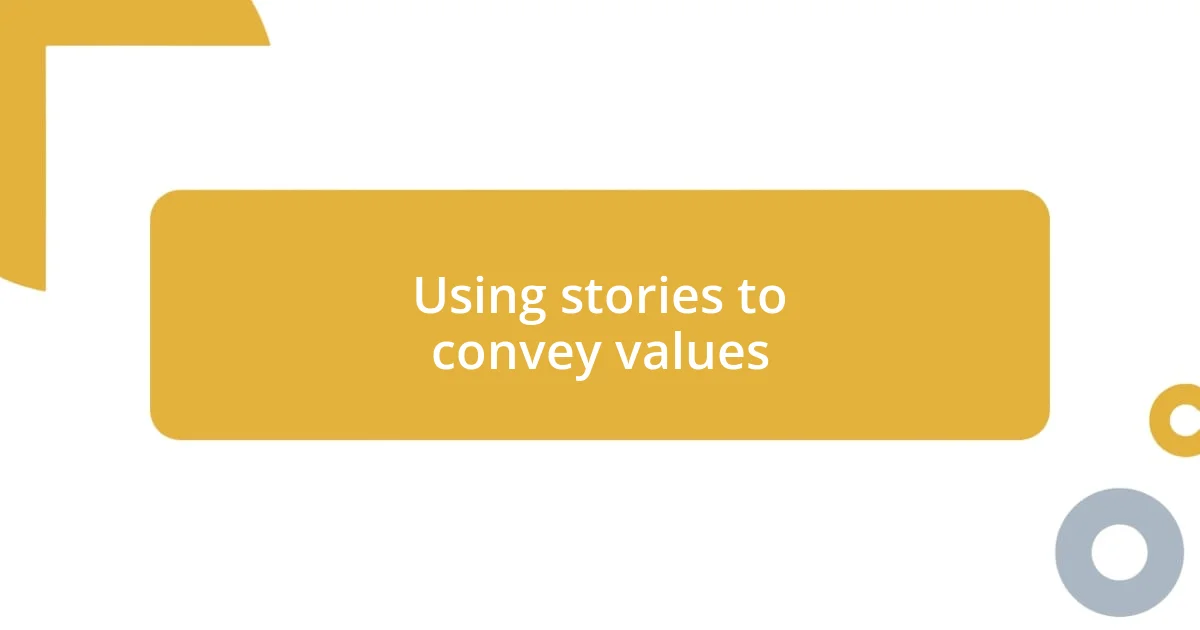
Using stories to convey values
Using stories as a means to convey values is profoundly impactful. I remember a time when I shared a tale about my grandmother’s dedication to community service. As I recounted her relentless efforts to help others, I noticed nods of approval and smiles from my audience. That simple narrative not only highlighted the value of altruism but also inspired many to reflect on their own contributions to the community.
In another instance, during a team meeting, I shared a story about a time I faced a moral dilemma at work. The lesson of integrity resonated so strongly that several colleagues opened up about similar experiences, reinforcing the importance of transparency and honesty in our professional lives. It made me realize how stories can act as catalysts, fostering conversations about shared values.
Have you ever pondered how a simple story can trigger such profound reflections? By sharing moments that define our values, we not only reveal our beliefs but also invite others to reconsider theirs. This exchange is more than an anecdote; it becomes a shared journey towards a deeper understanding of what we collectively prioritize in life.
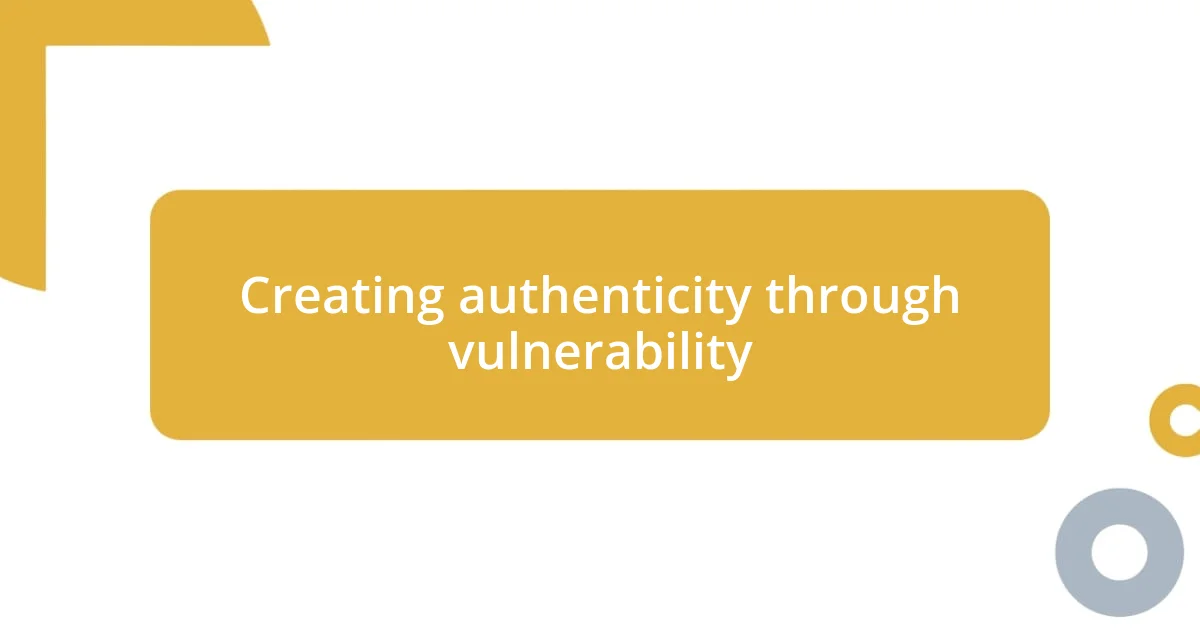
Creating authenticity through vulnerability
Creating authenticity through vulnerability can be a transformative experience. I recall a moment when I opened up about my struggles with self-doubt during a team retreat. As I laid bare my fears, I was met with silence at first, and then a wave of shared stories followed. It dawned on me that by showing my own insecurities, I had given others permission to voice theirs, fostering a genuine connection among us.
Vulnerability cultivates an environment where dialogue flourishes. I once attended a workshop where attendees shared their personal failures, and I remember feeling the tension in the room ease as each story unfolded. It was as if we were all saying, “You’re not alone.” The powerful realization that we are all imperfect human beings can deepen trust and understanding, establishing a foundation where authenticity thrives.
Have you experienced a moment where embracing vulnerability changed your perspective? When I shared a time I faltered in a project, it unlocked a discussion filled with empathy and support. That moment reinforced my belief that opening up isn’t just about revealing flaws; it’s an invitation for others to engage authentically, creating a richer, more relatable tapestry of human experience.
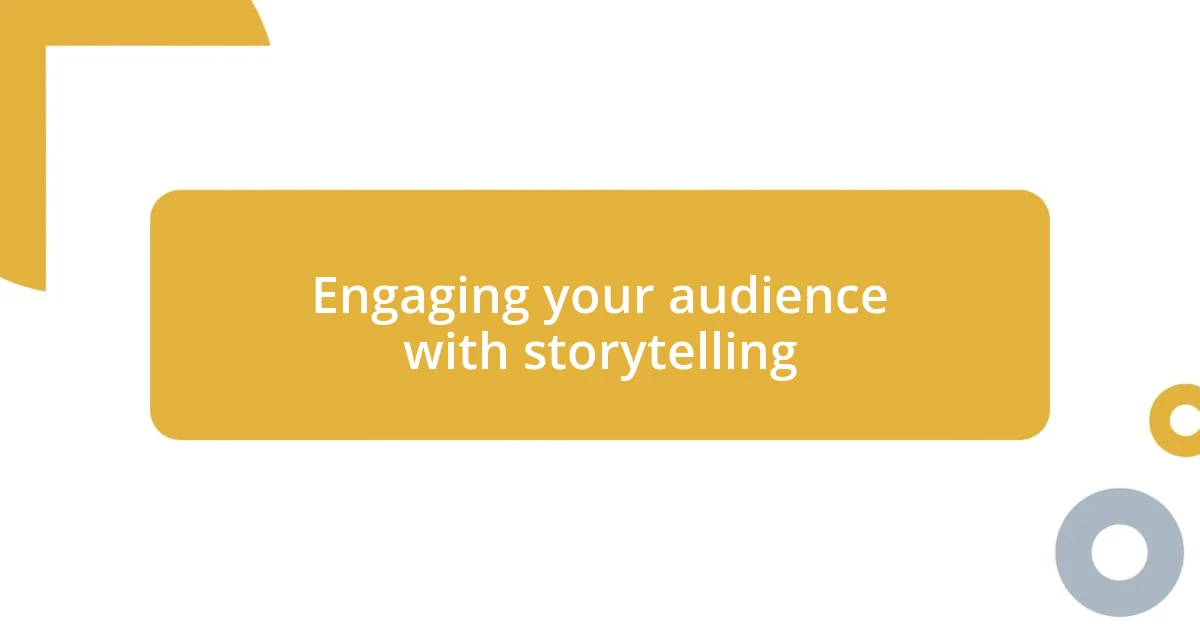
Engaging your audience with storytelling
When it comes to storytelling, I believe it’s all about creating connections. One evening, I shared a lighthearted tale about a cooking disaster with friends. As I described my chaotic experience in the kitchen, laughter erupted, and suddenly everyone was sharing their own culinary blunders. It struck me how humor can break down barriers, making even the most serious topics feel approachable. It’s fascinating how a simple story can create an instant bond, inviting everyone into a shared space of vulnerability and laughter.
On another occasion, during a community event, I recounted my journey of moving to a new city and the overwhelming emotions that came with it. I remember pausing as I felt the weight of my words, watching faces light up with recognition. “Have you ever felt like an outsider?” I asked, prompting a flurry of nods. It was in that moment I realized the power of connecting through shared experiences. Storytelling not only engages the audience but also provides them with a platform to voice their own feelings, subtly shifting the atmosphere from one of isolation to one of solidarity.
I often reflect on how stories can be a mirror, reflecting our collective hopes and fears. Recently, while facilitating a workshop, I shared a story about overcoming obstacles in my career. The room took on an atmosphere of anticipation, filled with eager faces longing for insight. As I opened the floor for discussions, participants began to share their own struggles, revealing not just their challenges but their aspirations too. It was a powerful reminder that when we engage through storytelling, we transform a mere exchange of words into a profound journey that sparks motivation and unity among us.












